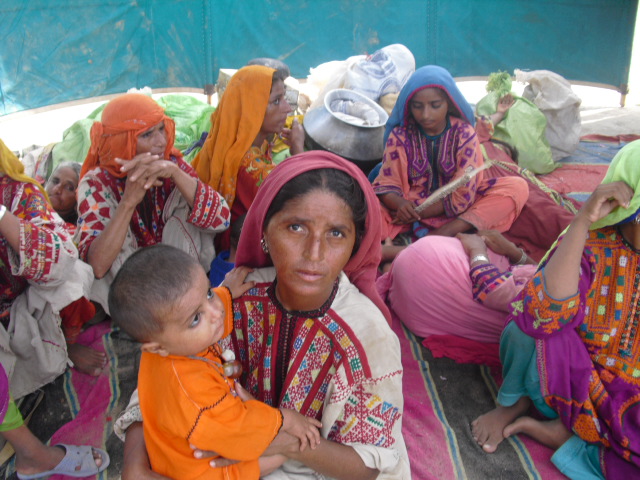An e-mailed image from Sindh, the front lines of Pakistan's flooding, unfolds across my computer screen: The haunted eyes of a mother peer into the camera as she lies under a low, crude shelter with her young daughter. The shelter looks like an upturned coffee table with a canvas tarp spread over its legs. It's actually a bed being used as a shelter. The daughter in a bright turquoise dress is lying on her side clutching her head as if in shock? Disbelief? A delicate blue-and-white embroidered pillow cradles both of them from ground baked by 120-degree days.
This mother and her daughter fled barefoot, becoming part of the swollen river of misery and suffering that now winds across Pakistan.
When I look into the mother's eyes, I don't see "Pakistan." I don't see "Taliban." I don't see "enemy." I see "mother." I see "woman." I see "sister."
When I look at her young daughter crumpled on the ground, I don't see "American-hating future terrorist" -- I see "child", "student" and "bright hope for the future."
When I look at the whole image, and think of it repeated across a country the size of Florida, I think of Desmond Tutu's words, "My humanity is caught up in your humanity."
I wonder about the mother and daughter's personal story. Which village were they from? Is it still underwater like many in Sindh? Were they living in poverty before or more prosperous? Is the mother illiterate? Was the daughter in school? Only 14 percent of girls in rural Pakistan can read or write. I wonder about their story. I wonder what our response will be.
We cannot let girls' education in Pakistan be swept away by rising flood waters. Girls are discovering they are smart, brave, leadership material. Girls are proving that they have what it takes to shape a more prosperous, peaceful, stable Pakistan.
Five months ago, Pakistan was just a numbing sea of bleak statistics. But when I joined the nonprofit Developments in Literacy (DIL), it suddenly became the home of beautiful, determined people I care about and can't look away from, even when the images are harsh. The images I'm viewing are from DIL's communities devastated by the flooding. DIL is one of the leading U.S.-based nonprofits at work in the most remote regions of Pakistan. A force for rural educational reform with 150 progressive schools and 17,000 students strong in often-forgotten villages, DIL is one of the few organizations with existing staff and infrastructure on the ground now responding to this crisis.
Out of the 48 schools DIL operates in Sindh, five are damaged and others are still in the path of rising flood waters. In the North, schools are open, but roads are engulfed and bridges collapsed. Thousands of DIL school families are devastated and homeless. Many of them worked fiercely for years to champion first schools in their communities.
As the threat of waterborne diseases mounts, DIL and partner Naz Old Boys Welfare Association (NOWA) are distributing emergency infant formula, water bottles, and packages with soap, water, shoes, clothing, water bottles, and other aid. Families are lined up along the roadside for assistance. Often they're grateful for just a mosquito net to protect the babies as the insect population explodes.
Whether the world community will get behind organizations like DIL and others at the forefront of education reform in Pakistan in the months ahead is up to all of us. Many of DIL's graduates are now teachers and are the first respected female leaders in their communities. Gulnzaz, one of DIL's teachers, who resisted the scorn and criticisms of her villagers, now walks 40 miles across baked clay to teach math in a rural classroom because, "it's my responsibility to transfer my knowledge to the next generation."
What can the next generation now expect? We can't respond to the rising rivers in Pakistan with a drought of compassion. More staggering images are coming in and each tells a story. But we can choose to shape and change and create a new story. Its main character: a girl.
